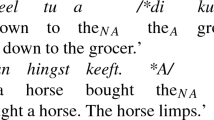Abstract
Szabó (2000) follows Heim (1982,1983) in viewing familiarity, rather thanuniqueness, as the essence of the definitearticle, but attempts to derive bothfamiliarity and uniqueness implicationspragmatically, assigning a single semanticinterpretation to both the definite andindefinite articles. I argue that if there isno semantic (conventional) distinction betweenthe articles, then there is no way to derivethese differences between them pragmatically.
Similar content being viewed by others
REFERENCES
Abbott, B. (1999): ‘Support for a Unique Theory of Definite Descriptions’, SALT 9: Proceedings from Semantics and Linguistic Theory IX (pp. 1–15), Ithaca, NY: CLC Publications.
Abbott, B. (2001): ‘Definiteness and indefiniteness’, to appear in L.R. Horn and Greory G. Ward (eds.), Handbook of Pragmatics, Oxford: Blackwell.
Bach, K. (2000): ‘Quantification, Qualification and Context: A Reply to Stanley and Szabó’, Mind and Language 15, 262–283.
Chafe, W. (1996): ‘Inferring Identifiability and Accessibility’, in T. Fretheim and J.K. Gundel (eds.), Reference and Referent Accessibility (pp. 37–46), Philadelphia: John Benjamins.
Christophersen, P. (1939): The Articles: A Study of Their Theory and Use in English, Copenhagen: Munksgaard.
Grice, H.P. (1975): ‘Logic and Conversation’, in P. Cole and J.L. Morgan (eds.), Syntax and Semantics, Vol. 3: Speech Acts (pp. 41–58), New York: Academic Press.
Hawkins, J.A. (1984): ‘A Note on Referent Identifiability and Co-Presence’, Journal of Pragmatics 8, 649–659.
Hawkins, J.A. (1991): ‘On (In)definite Articles: Implicatures and (Un)grammaticality Prediction’, Journal of Linguistics 27, 405–442.
Heim, I. (1982): The Semantics of Definite and Indefinite Noun Phrases, Amherst, MA: University of Massachusetts, doctoral dissertation.
Heim, I. (1983): ‘File Change Semantics and the Familiarity Theory of Definiteness’, in R. Bauerle, C. Schwarze and A. von Stechow (eds.),Meaning, Use and the Interpretation of Language (pp. 164–189), Berlin: Walter de Gruyter.
Horn, L.R. (1984): ‘Toward a New Taxonomy for Pragmatic Inference: Q-Based and R-Based Implicature’, in D. Schiffrin (ed.), Meaning, Form, and Use in Context: Linguistic Applications (pp. 11–42), Washington, DC: Georgetown University Press.
Lewis, D. (1979): ‘Scorekeeping in a Language Game’, Journal of Philosophical Logic 8, 339–359.
Löbner, S. (1985): ‘Definites’, Journal of Semantics 4, 279–326.
Ludlow, P. and Segal, G. (2002): ‘On a Unitary Semantical Analysis for Definite and Indefinite Descriptions’, to appear in A. Bezuidenhout and M. Reimer (eds.), Descriptions: Semantic and Pragmatic Perspectives, Oxford: Oxford University Press.
Millikan, R.G. (1984): Language, Thought, and other Biological Categories, Cambridge,MA: MIT Press.
Neale, S. (1990): Descriptions, Cambridge, MA: MIT Press.
Prince, E.F. (1992): ‘The ZPG Letter: Subjects, Definiteness, and Information Status’, in W.C. Mann and S.A. Thompson (eds.), Discourse Description: Diverse Linguistic Analyses of a Fund-Raising Text (pp. 295–326), Philadelphia: John Benjamins.
Reimer, M. (1998): ‘Quantification and Context’, Linguistics and Philosophy 21, 95–115.
Russell, B. (1905): ‘On Denoting’,Mind 14, 479–493.
Stalnaker, R.C. (1974): ‘Pragmatic Presuppositions’, in M.K. Munitz and P.K. Unger (eds.), Semantics and Philosophy (pp. 197–214), New York: New York University Press.
Szabó, Z.G. (2000): ‘Descriptions and Uniqueness’, Philosophical Studies 101, 29–57.
Zipf, G.K. (1949): Human Behavior and the Principle of Least Effort, Cambridge, MA: AddisonWesley.
Author information
Authors and Affiliations
Rights and permissions
About this article
Cite this article
Abbott, B. A Reply to Szabó’s “Descriptions and Uniqueness”. Philosophical Studies 113, 223–231 (2003). https://doi.org/10.1023/A:1024063903859
Issue Date:
DOI: https://doi.org/10.1023/A:1024063903859




